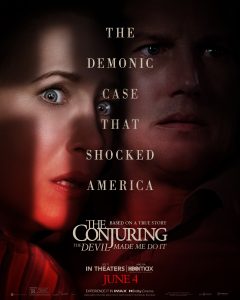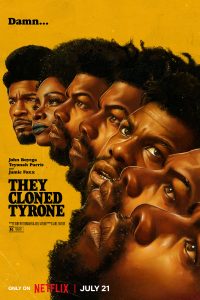The Greatest Trick the Devil Ever Pulled: Josh Pearce and Arley Sorg Discuss The Conjuring: The Devil Made Me Do It
Arley: I don’t know if it was a callback, or if it’s just one of those images that’s becoming a copy-paste in these kinds of movies, but there was a shot that was right out of The Exorcist.
Josh: That was a direct reference, for sure. The clothes, the streetlamp, the dramatic pause. The filmmakers are trying really hard to tie the Conjuring series to that lineage. The fonts, the credit roll, the droning chanting over the title sequence, all of that is them saying, “We’re the new Exorcist.”
Arley: If we start comparing it to The Exorcist, we’ll be here all day. That’s one of my favorite movies.
The Conjuring 3 is another case from the mixed-up files of “real-life” “paranormal investigators” Ed and Lorraine Warren (Patrick Wilson and Vera Farmiga), who this time involve themselves in the trial of accused murderer Arne Cheyenne Johnson (sensationalized by The New York Times as putting “The Devil on Trial”).
Out of the thousands of Warren investigations, this might not have been the best choice for adaptation into a suspenseful horror movie. In the film, Johnson’s lawyer stands up in court and enters a plea of “not guilty by reason of demonic possession,” and it cuts dramatically to the next scene. Ed and Lorraine then engage in amateurish detective work to prove that Johnson (Ruairi O’Connor) is actually possessed and therefore not responsible for his actions.
(In real life, Johnson’s lawyer tried entering that plea, but the judge immediately rejected it, so Johnson instead pled self-defense. The jury was prevented from considering any evidence relating to demons or the devil. Everything that follows that scene, including all of the Warrens’s involvement, is entirely fictionalized.)
Time is against them, because the possession is actually the result of a curse, and if the Occultist (Eugenie Bondurant) completes her ritual, she will gain great power.
Arley: Or something.
Josh: The whole premise for this movie is horseshit, even ignoring the fact that demons don’t exist and that the Warrens were, at best, severely deluded or, at worst, con artists. I understand sensationalizing a “true story” for entertainment value, I’ve got no problem with that, but if you’re going to make up stuff, at least make up something fun to watch.
Arley: All that goes back to what I’ve said before: If you actually enjoy the movie, then you’re less likely to care about any of those details. You can forgive a movie all of its bullshit if it’s entertaining. I really expected this to be thrilling and tense, but it’s almost like the franchise lost its way. Or, this could have been the first movie in the Conjuring series, ramping up to the other movies, which are far scarier. The plot was out of balance and out of order, because they frontloaded some of the best scary moments and then followed it up with this fake, kind of weak mystery. It would have been stronger to open with the mystery, try to get us attached to the characters, and then build into the supernatural elements.
The Conjuring cinematic universe currently consists of eight movies (with two more planned): the core trilogy, three movies about the haunted Annabelle doll, one about an evil nun, and the tangentially related The Curse of La Llorona. James Wan co-created this series and directed The Conjuring 1 & 2, but The Devil Made Me Do It was turned over to La Llorona director Michael Chaves. Changing horses in midstream, especially from Wan (who also created the highly successful Saw and Insidious franchises) to Chaves (who directed the lowest-grossing movie in the Conjuring universe) probably has much to do with the drop in quality.
Josh: The guy who wrote this also wrote Aquaman, which I thought was laughably bad.
Arley: James Wan directed that, and Patrick Wilson was in it, too. Is Conjuring 3 a secret Aquaman movie?
Josh: It was definitely a letdown compared to the previous two Conjuring movies. The first Conjuring was great. The second one got a little goofy in the middle, but it was still pretty creepy.
Arley: The Annabelle movies were actually good. At least, those and the Conjuring movies had legit scary moments.
Josh: I saw the first one and thought it was terrible, but you and I have wildly different opinions on horror films. We can both agree that this movie was bad, though.
Arley: Worse than bad: it was boring.
Mystery stories rely on rules, a following of clues to a reasonable conclusion. The Conjuring 3 leads the audience through an incomprehensible subplot regarding a missing college student and briefly introduces a police detective character, though much of the investigation hinges on convenient psychic visions rather than actual police work.
The Occultist’s motivation remains unclear up until the final seconds of the film, as does the range of her powers. Atop all this, the Conjuring universe relies heavily on a Christian mythology in which demons can sometimes do some things, other times cannot, and are never given an established reason for doing anything. Sure, in a ghost story, rules are arbitrary, but in any story, rules should at the very least be internally consistent.
From Jorge Luis Borges’s 1933 “Leyes de la narración policial”, detective fiction requires:
A solution that is both necessary and marvelous. The former establishes that the problem is a “determined” one, with only one solution. The latter requires that the solution be something that the reader marvels over—without, of course, resorting to the supernatural, whose use in this genre of fiction is slothful and felonious. Also prohibited are hypnotism, telepathic hallucinations, portents, elixirs with unknown effects, ingenious pseudoscientific tricks, and lucky charms. Chesterton always performs a tour de force by proposing a supernatural explanation and then replacing it, losing nothing, with one from this world.
Or, to put it more succinctly: as H.G. Wells (supposedly) said, “If anything is possible, then nothing is interesting.”
Josh: The filmmakers stated that they wanted to take the series in a different direction and not do another haunted house story, which I appreciate. I like when people take risks in their stories, and I like paranormal investigation, so this had a lot of potential, but this was ultimately a subpar X-Files episode. I was afraid this was going to turn into a really boring courtroom drama, but thank god at least that didn’t happen.
Arley: I feel like they didn’t know what to make this movie. It starts as a horror movie, and then it becomes a suspense mystery. It ends up not really working as either. The main problem is them not knowing how to use tension. Like, where does tension go? How do I deliver tension? I don’t know. I’m just gonna put it randomly in this scene. For example, the scene where they find the witch’s curse in the vase. It’s overly dramatic and dumb.
Josh: I noticed that, too, specifically in two other scenes. First when Ed Warren rushes out of the house and leaves his heart medicine behind, and the camera zooms in on the pill bottle. And then in the morgue, the camera lingers on the timer light-switch. Those are such tiny threats in the midst of much larger dangers. I don’t know why they’re built up as the movie’s moments of suspense because they’re not very interesting and they’re almost immediately undercut or defused.
A Vulture article claims that the Conjuring series is actually a love story, and The Conjuring 3 tries hard to sell the relationship between Ed and Lorraine Warren as something the audience should care about, but none of it lands. We’ve had several other movies in which their past could have been explored, so putting it in at the end of the trilogy is too little, too late. Flashbacks to their younger selves only serve to further interrupt the progression of the plot.
The first victim of demonic possession in the movie, young David Glatzel (Julian Hilliard), is more sympathetic than Arne Johnson, so transferring the demon between them reverses the natural flow of tension. The danger to the most vulnerable character is resolved in the first few minutes — we therefore don’t care (or don’t care as much) about anyone else the movie spends the rest of its time focusing on.
Josh: I didn’t give a shit about the Warrens, mostly because they seemed like really shady people in real life, and the other main characters were equally uninteresting. I blame this on the directing, though, because the cast was pretty good. Everybody was giving it a decent try, even in situations that are totally ridiculous. Like when Vera Farmiga is having that psychic vision and pretending to stab someone, it looks so goofy, but you can tell she’s trying really hard to sell it.
Arley: I have to say, I find John Noble really annoying. I feel like he’s always playing a character, in that sense that you can tell that they’re playing a character, rather than like somebody that is just in the movie. I find his style overly affected. Basically, I’m just like, calm down.
The movie does contain a handful of scary/creepy images — notably: a scary hand, a rat in a wall, a dog kennel — but it’s missing the big sequences of the first two installments, the set pieces that the tension in each act should be building toward. After a fairly decent horror-movie beginning, the middle of the movie sags, bogged down by the amount of dull information needed to build a mystery plot. The ending confrontation is kind of fun — Lorraine has the particular existential dread of seeing one’s self that we’ve mentioned in a previous review — but the payoff isn’t enough to be worth the slog of getting to it.
Arley: They had a lot of settings that they could have utilized to better horrific effect. The tunnels, yeah, but also the prison.
Josh: Oh, for sure. Haunted prisons are fun. Well, I’m probably done with the Conjuring series for good, so I’m just going to leave a list of X-Files episodes here that are more enjoyable than watching this sham.
-
- Season 3, Episode 4: “Clyde Bruckman’s Final Repose” and Season 1, Episode 13: “Beyond the Sea“, for good psychic stories.
- Season 5, Episode 10: “Chinga“, for haunted doll.
- Season 2, Episode 14: “Die Hand Die Verletzt“, for witchcraft.
- Season 3, Episode 5: “The List“, for haunted prison.
- Season 6, Episode 7: “Terms of Endearment“, for demonic possession.
Directed by: Michael Chaves
Written by: David Leslie Johnson-McGoldrick & James Wan, based on characters created by Chad Hayes & Carey W. Hayes
Starring: Patrick Wilson, Vera Farmiga, Ruairi O’Connor, Sarah Catherine Hook, Julian Hilliard, John Noble & Eugenie Bondurant

ARLEY SORG, Senior Editor, grew up in England, Hawaii, and Colorado. He lives in Oakland, CA. A 2014 Odyssey Writing Workshop graduate, Arley is co-Editor-in-Chief at Fantasy Magazine, Associate Editor and reviewer at Lightspeed & Nightmare magazines, columnist for The Magazine of Fantasy and Science Fiction, and interviewer at Clarkesworld Magazine. He can be found at arleysorg.com – where he has started his own “casual interview” series with authors and editors – and on Twitter (@arleysorg).
JOSH PEARCE has stories and poetry in Analog, Asimov’s, Beneath Ceaseless Skies, Cast of Wonders, Clarkesworld, IGMS, Nature, and more. Find him on Twitter: @fictionaljosh, or at fictionaljosh.com. One time, Ken Jennings signed his chest.
 While you are here, please take a moment to support Locus with a one-time or recurring donation. We rely on reader donations to keep the magazine and site going, and would like to keep the site paywall free, but WE NEED YOUR FINANCIAL SUPPORT to continue quality coverage of the science fiction and fantasy field.
While you are here, please take a moment to support Locus with a one-time or recurring donation. We rely on reader donations to keep the magazine and site going, and would like to keep the site paywall free, but WE NEED YOUR FINANCIAL SUPPORT to continue quality coverage of the science fiction and fantasy field.
©Locus Magazine. Copyrighted material may not be republished without permission of LSFF.








